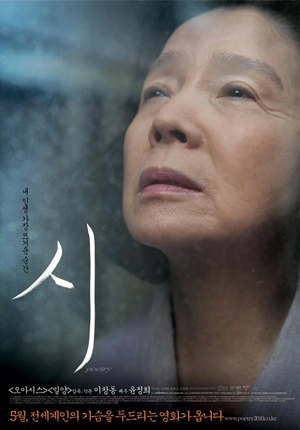*SPOILERS BELOW*
The narrative of Poetry is told through the eyes of a 66-year-old Korean woman named Mija (Jeong-hie Yun). Her one general role in life is that of a caretaker, both for her grandson, and for an elderly disabled man who pays her to bathe him and do his errands. She decides to enter herself into a poetry class, with a goal of writing one poem by the end of the month. The real conflict of the film arises when it is revealed that her grandson was one of six individuals who had consistently abused a girl sexually for months, before she committed suicide. Though there is no concrete evidence of this, the girl had revealed the events in her diary, and a police investigation could only be avoided if a financial settlement is agreed upon with the family.
A recurring theme of the film is one of a conscious sensibility, a heightened awareness of the surrounding outside world. The instructor of the writing class informs the students that in order for poetry to be created, one must go out of their way to "see" the world around them. With this new perspective, Mija tends to find beauty in the natural living things, despite the tragedy that is going on around her. While the boys' fathers are focused on the prevention of consequences of their sons' actions, Mija sympathizes for the soul of the deceased. She begins to feel a certain "oneness" with the girl; the poem she ends up completing by the end is even written as if it is essentially through the girl's own voice.
Likewise, the narrative of the film is created so the audience itself forms a oneness with the character of Mija. Much like one reads a poem through an assumed voice, the assumed "voice" here is Mija's presence, and viewers follow her perspective for nearly every scene of the film. The actress who plays Mija does a great job in conveying the most important aspects of her motherly nature, as well as the anguish and frustration she feels for the world's tragedies. The caring side of her is in conflict, because she wishes to protect her grandson so badly, but is also rather empathetic for the victim. In the end, she forces her grandson to live up to his actions. Yet her actions were not simply done to satisfy society's notions of right and wrong, but rather to satisfy the humanistic needs within herself; to put this soul to rest and allow the beauty of life to flourish.
Poetry in itself is conceived much like a poem. Mija herself is the narrative voice. Various motifs are scattered throughout (family, flowers, the color red). The film starts at a river, and ends at the same river. It has its various ebbs and flows throughout its entirety. More importantly, it's absolutely lovely, with a natural style that dwells just below minimalism. It's a film that will definitely take some time to fully process, but continues to be a wonderful journey throughout.
My rating: 4/5

No comments:
Post a Comment